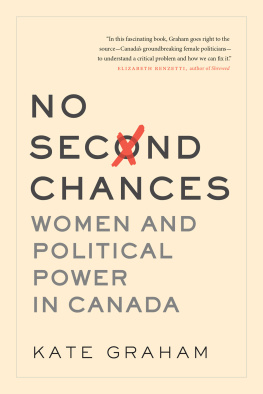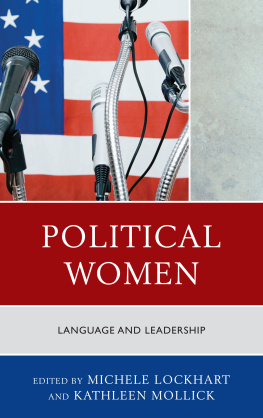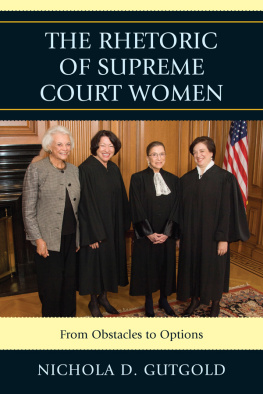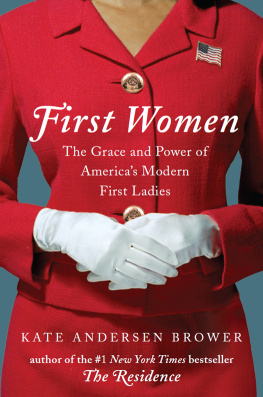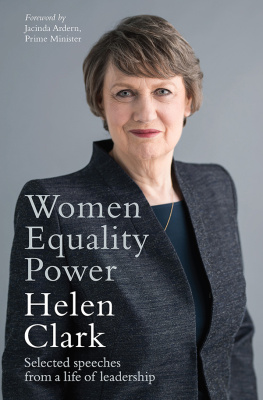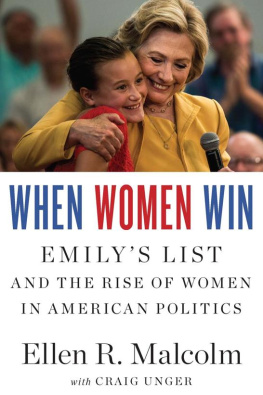
a feminist history society book
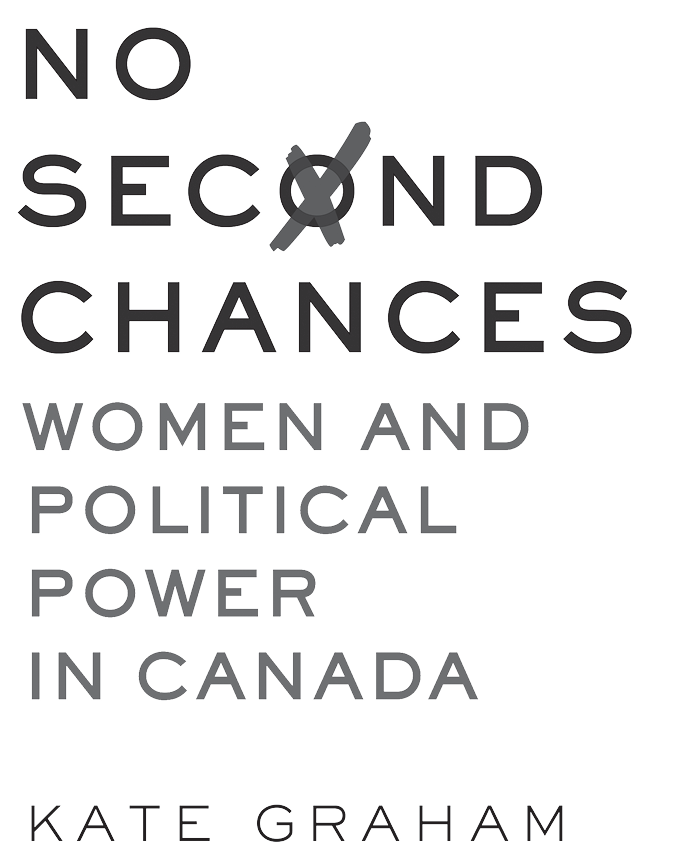
Library and Archives Canada Cataloguing in Publication
Title: No second chances : women and political power in Canada / Kate Graham.
Names: Graham, Kate, 1984- author.
Series: Feminist history society series.
Description: Series statement: A feminist history society book | Includes bibliographical references and index.
Identifiers: Canadiana (print) 20210297735 | Canadiana (ebook) 20210297808 | ISBN 9781772602180 (softcover) | ISBN 9781772602197 (EPUB)
Subjects: LCSH: Women politiciansCanadaBiography. | LCSH: PoliticiansCanadaBiography. | LCSH: Women legislatorsCanadaBiography. | LCSH: LegislatorsCanadaBiography. | LCSH: WomenPolitical activityCanada. | LCSH: Political leadershipCanada. | LCGFT: Biographies.
Classification: LCC FC26.P6 G73 2022 | DDC 324.2092/52dc23
Copyright 2022 by Kate Graham
www.FeministHistories.ca
Cover by Ingrid Paulson
Edited by Andrea Knight
Second Story Press gratefully acknowledges the support of the Ontario Arts Council and the Canada Council for the Arts for our publishing program. We acknowledge the financial support of the Government of Canada through the Canada Book Fund.
Published by
Second Story Press
20 Maud Street, Suite 401
Toronto, ON M5V 2M5
www.secondstorypress.ca



For Deb Matthews.
Thanks for asking.
Contents
Preface
In 2018, I did something that not enough women in Canada have done: I ran for office. I was working as a public servant at the time, and when I shared my decision with family, friends, and colleagues, the feedback was less than encouraging:
But dont you want to have kids?
Why would you quit your six-figure job on a chance? What about your pension?
Are you sure you want to put yourself through that?
The months that followed proved to be an education like no other. I spent hours each day knocking on doors. I stood on tens of thousands of doorsteps and listened to what people had to say. I was running for the Ontario Liberal Party led by Kathleen Wynnethe only female premier in Ontarios history and the first openly gay premier in Canada. She had led the party to victory in 2014 and was seeking a second mandate.
It was an angry election. To put it bluntly, Premier Wynne was hated. Front lawns sported Unplug Wynne signs in reference to divisive hydro issues. Social media ads frequently flashed unflattering photos of the premiers face with a thick line through it. According to the polls, more than 70 per cent of Ontarians disapproved of the premier and the numbers only grew worse as the campaign waged on. When the premier visited our riding for campaign events, we had protesters at the campaign office.
On election night, the party suffered the worst defeat in its history, falling from a majority government to losing official party status. Almost all the partys caucus and every new candidate lost, including me.
Every election has its policy disputes and that was certainly true in Ontario in 2018, but this election felt particularly personal. During the campaign I had listened to thousands of people talk about the premier. I had the same conversation over and over again.
You seem fine, but I cant support your leader. She has to go.
I always replied calmly, asking the same question: What is it about the premier that you dont like?
This would be met with a long pause and then, too often, one of the following replies:
Its the sound of her voice. I just cant stand it.
Its her face. (Yes, people really did say this.)
I just really cant stand her.
Long after the election ended, I could not erase these conversations from my mind. I began reading about the defeats of other female premiers in Canada. I was surprised to find similar media stories from other provinces about the unpopular, seemingly unlikable women who led them. The shared glass cliff experiencea term from the business world about female CEO s rising to the top job only when the company was facing declinewas all too common. I calculated the average tenure for premiers, only to find that it is significantly shorter for women. And most concerningly, when female premiers run for re-election, they lose. Canadians have never re-elected a female first minister.
I needed to learn more. With the support of Canada 2020, an Ottawa-based policy think tank, I travelled across Canada to meet with the women who have led our provinces, territories, and country. We spent hours in their kitchens, living rooms, and front porches talking about the rise and fall of their political careers. I asked them to help me understand why we dont see female political leaders succeeding in Canada to the same extent as men. These conversations formed the basis of a podcast project called No Second Chances . More than 75,000 Canadians have listened to the podcast, and we heard from many people (mostly women) who found the stories of Canadas female leaders to be inspiring and motivating.
One of the limitations of podcasting is that the interviews are cut into short clips, so listeners dont have the opportunity to hear the speakers in long form. This book is intended to address this deficiency. It presents the perspectives of the first ministers in long form. It captures an important part of Canadian history and preserves the perspectives of the small group of trailblazing women who have risen to Canadas peak political posts. Importantly, these interviews were conducted in 2019, a moment in time when every single first minister in Canada was a man, a sorry statement about the intersection of gender and political leadership in our country. This book captures a contemporary reflection on how and why this happened, and what can be done to make greater progress toward gender equity in political leadership in the future.
My hope is that a Canadian picking up this book fifty or a hundred years in the future will find its contents foreign and peculiar. The experiences of women in Canadas most senior political roles shed much light on the reasons why there have been so few of them in the first place.
I hope it will also seem unusual that this book includes only the perspectives of Indigenous and white women. To date, a Black or racialized woman has never been elected as a first minister in Canada. In fact, many equity-seeking groups have never been represented in our top elected offices. It is only Canadas territories that have elected Indigenous women as their premiers.
This must change.
The lack of diversity within our most senior parliamentary levels is one of the reasons that, as a country, we have not advanced further on many of the most significant challenges we face.
The research is clear. Until we see more womenand a greater diversity of womenin our highest political offices, we will not be able to address the deep inequalities that exist in our country. It is that simple. Having a greater number and diversity of women in the most senior leadership roles will lead to decisions being made that benefit more people. Similarly, the election of women to those roles is a marker, or a product, of the extent to which our society has evolved into one in which opportunities are truly equal. A lack of diversity in our top political roles is a sign of a much more concerning imbalance and injustice in the society our politicians govern. Its like the seemingly benign physical symptoms that signal a much more serious disease underneath.
Next page
